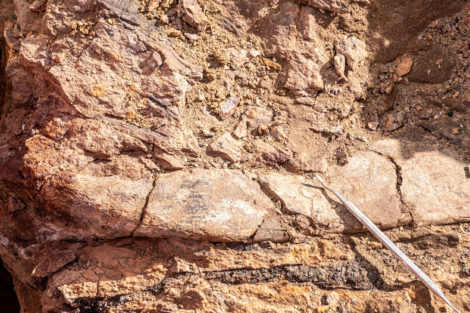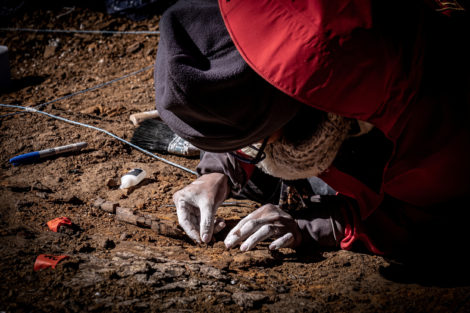Scientists unearth megaraptors, feathered dinosaur fossils in Chile’s Patagonia

A view of a fossil at the area where scientists discovered megaraptor fossils at ‘Guido’ hill in the Chilean Patagonia area, close to Torres del Paine park, in Magallanes and Antarctic region, Chile in this undated handout photo provided by the Instituto Chileno Antartico on January 16, 2023. Instituto Chileno Antartico/Handout via REUTERS
Scientists in Chile’s Patagonia region are unearthing the southernmost dinosaur fossils recorded outside Antarctica, including remains of megaraptors that would have dominated the area’s food chain before their mass extinction.
Fossils of megaraptors, a carnivorous dinosaur that inhabited parts of South America during the Cretaceous period some 70 million years ago, were found in sizes up to 10 meters long, according to the Journal of South American Earth Sciences.
“We were missing a piece,” Marcelo Leppe, director of the Chilean Antarctic Institute (INACH), told Reuters. “We knew where there were large mammals, there would also be large carnivores, but we hadn’t found them yet.”
The remains, recovered from Chile’s far south Rio de las Chinas Valley in the Magallanes Basin between 2016 and 2020, also include some unusual remains of unenlagia, velociraptor-like dinosaurs that likely lived covered in feathers.
The specimens, according to University of Chile researcher Jared Amudeo, had some characteristics not present in Argentine or Brazilian counterparts.
“It could be a new species, which is very likely, or belong to another family of dinosaurs that are closely related,” he said, adding more conclusive evidence is needed.

A man works at the area where scientists discovered megaraptor fossils at ‘Guido’ hill in the Chilean Patagonia area, close to Torres del Paine park, in Magallanes and Antarctic region, Chile in this undated handout photo provided by the Instituto Chileno Antartico on January 16, 2023. Instituto Chileno Antartico/Handout via REUTERS
The studies also shed more light on the conditions of the meteorite impact on Mexico’s Yucatan Peninsula that may have triggered the dinosaurs’ extinction some 65 million years ago.
INACH’s Leppe pointed to a sharp drop in temperatures over present-day Patagonia and waves of intense cold lasting up to several thousand years, in contrast to the extremely warm climate that prevailed for much of the Cretaceous period.
“The enormous variation we are seeing, the biological diversity, was also responding to very powerful environmental stimuli,” Leppe said.
“This world was already in crisis before (the meteorite) and this is evidenced in the rocks of the Rio de las Chinas Valley,” he said.
RELATED STORIES
Europe’s ‘largest predatory dinosaur’ found by UK fossil hunter
Fossil of dinosaur with hard head and tiny arms found in Argentina